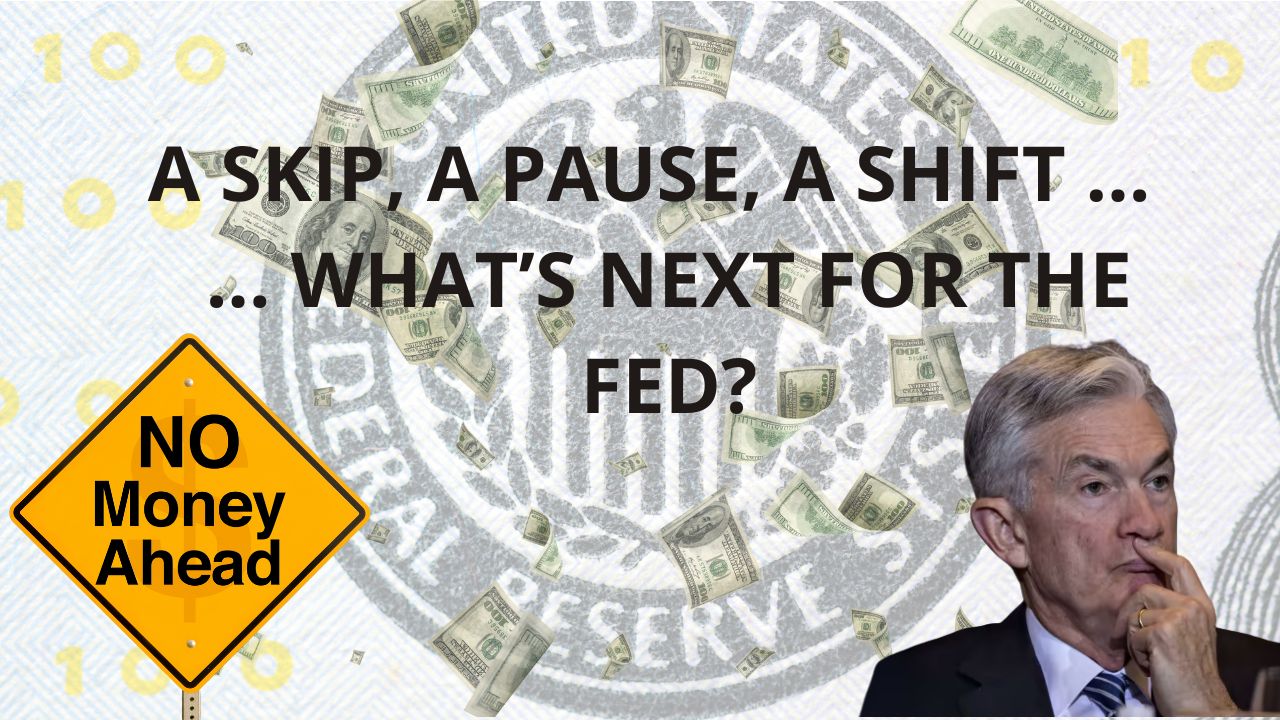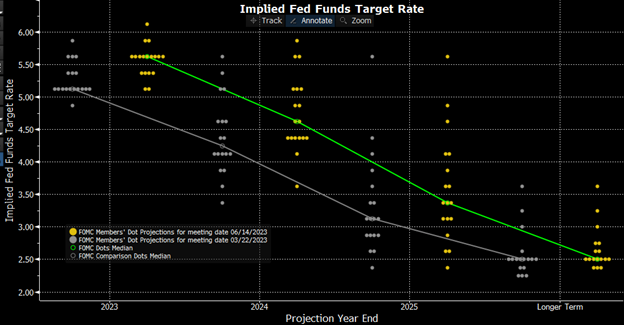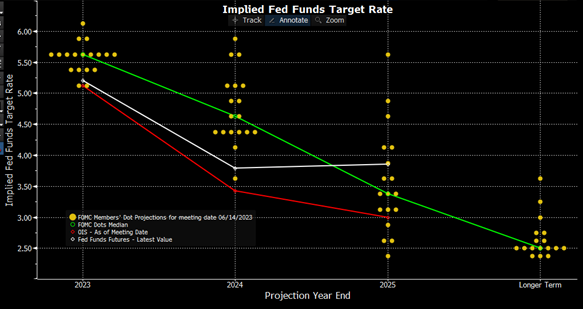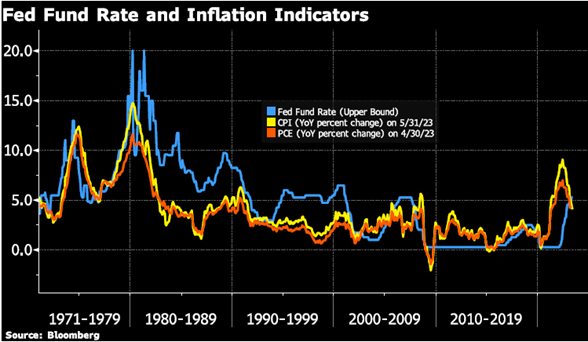A Skip, A Pause, A Shift? … What’s Next For The Fed?

A pensive-looking Fed Chairman Jerome Powell
The Fed did not increase interest rates further this week, but updated projections show the committee has increased how high they expect rates will go this year. Markets and their participants spend a long time trying to predict the Fed’s and other central banks’ next moves, but when it comes to wealth preservation this isn’t always the best approach. The impact of central bank policies is felt over the years, not just month to month. And in those years the impact is widespread. That’s why when it comes to wealth preservation, gold, and silver are the ideal assets to hold in the long-term.
Despite the Fed holding interest rates, the projections released with the statement show that the rate setting committee raised its target for the fed funds rate at the end of the next three years. The so called, dot-plots are charted below in yellow – each dot represents each committee member’s estimate of the year end rate. The green line is the median of the yellow dots. The gray dots and line are the estimates from the prior meeting of March 21-22, 2023.

The Fed’s “Dot-Plot”
Gold and silver prices declined sharply when the Fed’s statement and Summary of Economic Projections were released due to the expected higher interest rates. Later they recovered somewhat as Chair Powell’s press conference commenced then declinedagain later in the afternoon. This is indicative of the recent recalibration in markets around Fed speeches, US data releases, and Fed meetings as the market is trying to digest the ambiguity of what the Fed’s next move will be.
More increases to come?
Bond and interest rate markets also recalibrated on Wednesday with expectations of a rate cut later this year being largely pushed to early next year.
However, neither the Fed Future markets (white line on chart below) nor the OIS (Overnight Interest Rate Swaps, red line on chart below) markets are assuming more increases this year. Instead those markets predict the Fed will cut rates much more by the end of next year than the Fed itself projects.

Implied Fed Funds Target Rate
Is the Fed correct or is the market correct? Only time will tell for sure. But keep in mind that the Fed statement and Chair Powell in the press conference continue to stress the central bank’s stance of getting inflation growth down to 2%. With inflation still above 4% (and core inflation flattening) the Fed has to ‘save face’ while pausing. Face is saved by reminding everyone‘inflation is its top goal’.
More riddles and convoluted answers
Chair Powell was asked, since most of the committee expects to raise rates more this year, then why not raise at this meeting? His convoluted answer included that the “…question of speed is a separate from level. In terms of speed it was important last year but as the Fed gets closer to the destination … its common sense to go a little slower just like it was to go from 75 basis points, to 50 basis points, to 25 basis point increases at each meeting the committee thought that it is appropriate to moderate the pace, if only slightly … if gives [the Fed] more information to make decisions, try to make better decisions, it allows the economy a little more time to adapt as [the Fed] makes its decisions going forward. We don’t know the full extent of the consequences of the banking turmoil to see that unfolding.”
Chair Powell was then questioned further about the economic projections, if the Fed is focused on getting inflation down to 2% then why does the committee’s median estimate show inflation still elevated but rates decline next year?
Who puts weight on forecasts, anyway?
Chair Powell’s answer here gets even more convoluted, he started by saying that he wouldn’t put too much weight on forecasts two or three years out because of the uncertainty ( economic conditions do change quickly), but then went on to say thatas inflation comes down in the forecast, if they do not lower interest rates then the real rates are going up, so to just maintain a real rate, the nominal rate two years out, let’s say, should come down to maintain real rates. In other words, inflation is going to stay above 2% for quite some time!We do not rule out the Fed increasing its inflation target to 3% or 4% over time.

Fed Funds Rate and Inflation Indicators
The Fed needed to pause on hiking rates to take inventory of the damage the rapid increase has already had on the economy. Rapidly rising rates do take time to work through the economy. Meanwhile the banking sector still has widening cracks as the value of bank’s bond holdings decline as interest rates rise, not to mention pension funds and insurance companies that also hold massive amounts of bonds. The commercial real estate is close to shambles, the household sector is still spending through higher credit card debt. The business sector is trying to pay down debt as rates are rising. Bloomberg reports: Interest costs at US companies rose by 22% in the first quarter compared to a year earlier, soon after the Federal Reserve started raising rates, according to a recent survey of about 1,700 businesses by Calcbench Inc., a data provider.
Debt incoming
Added to this is that the US Treasury will be issuing a Tsunami of debt in order to refill its coffers after the six-month debt ceiling debate, to the tune of upwards of $1.5 trillion over the next year. U.S. Treasury Secretary Janet Yellen told Congress on Tuesday this week that: It is our obligation to rebuild the Treasury balance up to a safe and appropriate level, but we’ve consulted widely with market participants about what the best way is to do that to minimize the cost to the federal government and to avoid market disruption to the maximum extent possible. However, issuing that much debt into the current market doesn’t come without risk. It is also interesting that when the U.S. government is in preparation for issuing large amounts of debt that Yellen also told Congress that it would be a ‘mistake for the United States to decouple from China’ and even told Congress that economic ties with China should be deepened. China is the second largest foreign holder of U.S. debt (Japan is the largest). This comes after only last year Yellen made a speech on the importance of ‘friend-shoring’, which did not include China as a friend! (See our post The ‘Friend-Shoring’ of Gold – A New World Order?)
The adage Don’t fight the Fed comes up as markets are recalibrating. Everyone spends time trying to figure out what the Fed’s next move is going to be – but investors can take advantage of the dips in gold and silver prices as it is inevitable that the Fed will fumble around until something breaks. Once something big breaks they have to ease in order to ‘repair’ the damage’, holding gold and silver takes the counterparty risk out of investment.
More By This Author:
SEC Action Shows Why Cryptos Are Not “As Good As Gold”
Gold-Copper Ratio Points To Debilitating Economic Health Issues Ahead
Three Factors Driving Gold Higher
Disclosure: The information in this document has been obtained from sources, which we believe to be reliable. We cannot guarantee its accuracy or completeness. It does not constitute a solicitation ...
more


